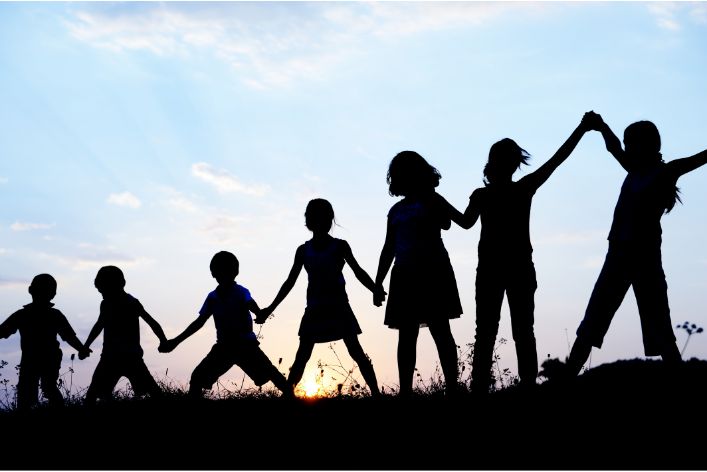Introduction
Child development is a critical process that involves physical, emotional, social, and cognitive changes that take place from infancy to adolescence. Understanding this process is essential as it guides parents and caregivers on how to support and nurture children.
Child development in Nigeria is unique due to various factors such as cultural, economic, and social differences that influence parenting approaches. Despite these challenges, fostering healthy child development is a priority for every Nigerian parent.
Collaboration between parents, caregivers, teachers, and healthcare professionals is critical in ensuring optimum child development.
By understanding age-by-age milestone guides, Nigerian parents can promote their children’s development by providing opportunities that foster growth, such as play, learning activities, and exposure to their cultural heritage.
Generally, every child is unique and develops at their own pace. But by understanding the milestones that children should be reaching at each age, parents can foster an environment conducive to healthy development.
By gaining insight into child development in Nigeria, parents and caregivers can support children to grow into well-rounded and balanced individuals equipped to navigate the challenges of life.
Age 0-6 Months: Development Milestones for Your Child in Nigeria
In the first six months, a baby’s development takes place at a rapid pace, and certain milestones are accomplished. Here are the physical, cognitive, social and emotional development milestones:
Physical Development Milestones
- A baby can lift its head and chest while lying on their stomach
- They can grasp objects and bring them to their mouth
- Babies start to roll over by 4-5 months, sit with support by 5-6 months
Cognitive Development Milestones
- A baby will recognize their primary caregiver
- They start to learn cause and effect by shaking a rattle
- Babies may imitate facial expressions and movements of others
Social and Emotional Development Milestones
- Babies develop an attachment to their primary caregiver
- They will start to socially smile as a response to their caregiver’s interaction
- Babies may cry when separated from their caregiver
It is important to provide a safe and nurturing environment to meet their physical needs while fostering their cognitive, social, and emotional development. Interacting with your baby through smiling, talking, and singing can encourage development and strengthen the bond between the baby and caregiver.
Read: Nurturing Growth: Development Stages for Nigerian Children
Age 7-12 months: Development Milestones for Your Child in Nigeria
At this stage, your child is growing rapidly and reaching several developmental milestones. Here are some of the milestones for physical, cognitive, social, and emotional progress:
Physical Development Milestones
- Your baby starts crawling and may pull themselves up to stand with support
- They learn to sit up without support and balance while sitting
- They develop more control of their neck and head movements
- They start to improve their fine motor skills by picking up small objects between their fingers
- Their vision improves and they can see objects from a distance with more clarity
Cognitive Development Milestones
- Your baby learns the concept of object permanence – knowing that objects exist even when they can’t be seen
- They begin to recognize familiar faces and people
- They develop an understanding of cause and effect
- They start babbling and imitate sounds made by others
- They learn to respond to their name and understand simple commands
Social and Emotional Development Milestones
- They start to develop stranger anxiety and cling to familiar people
- They recognize and respond to familiar faces and voices
- They show more interest in social interactions and start to play with others
- They develop a stronger bond with parents and caregivers
- They are able to express emotions like joy, anger, and frustration
As a parent in Nigeria, you can help your child reach these milestones by providing them with a safe and stimulating environment to explore and learn. Encourage their development with toys, playtime, and social interactions, and always celebrate their achievements along the way!
Read: Raising Kids in Nigeria: Understanding Milestones
Age 1-2 years: Development Milestones for Your Child in Nigeria
Physical Development Milestones (e.g., Walking and Running)
At around 12 months, babies begin to take their first steps and may be able to walk entirely on their own by 14-15 months.
They develop better balance and coordination and can run and climb stairs by age 2. Children also become more dexterous and can manipulate objects better, such as holding a spoon or crayon.
Cognitive Development Milestones (e.g., Beginning of Symbolic Play)
As children approach their second birthday, they begin to develop symbolic thinking and engage in pretend play.
Parenting Made Just for You
Get personalized Parenting Solutions tailored to your child’s needs. Transform your parenting journey with expert guidance in 1-3 days.
Get StartedThey may imitate common actions, such as sweeping the floor, and use objects to represent others, such as using a block as a phone. They can also understand simple instructions and follow routines.
Social and Emotional Development Milestones (e.g., Increased Independence and Attachment to Peers)
By age 1, children start to show increased independence and may develop separation anxiety when separated from their parents.
However, they also begin to develop strong attachments to peers and may engage in parallel play, where they play alongside but not necessarily with other children.
By age 2, children begin to show empathy and understand others’ emotions, such as crying when seeing someone else cry.
Overall, the age of 1-2 years marks significant milestones in physical, cognitive, and social-emotional development. Children may progress at different rates, but as long as they are meeting general milestones, parents should not worry.
Encouraging physical activity, providing opportunities for imaginative play, and fostering positive relationships with peers can all support healthy development during this period.
Read: Key Developmental Milestones: A Guide for Nigerian Parents

Age 3-5 years: Development Milestones for Your Child in Nigeria
At this age, children are full of energy and curiosity. They love to explore and learn new things, and their physical, cognitive, social, and emotional development is rapidly progressing. Here are some of the milestones you can expect to see during the ages of 3 to 5 years:
Physical Development Milestones
- Improved fine motor skills, such as using scissors and drawing circles and squares
- Increase in gross motor skills, such as running, jumping, and skipping
- Ability to dress themselves, including putting on and taking off clothes, shoes, and socks
- Improved coordination and balance, allowing them to climb and ride bicycles
- Development of hand-eye coordination, allowing them to catch and throw a ball with greater accuracy
- Improved health and physical growth, with an average height of 39 inches and weight of 40 pounds for boys and slightly less for girls.
Cognitive Development Milestones
- Improved language development, with an ability to form longer sentences and understand complex vocabulary
- Increasingly curious about the world around them and asking many questions
- Better memory and recall ability, allowing them to remember names, places and experiences from the past
- Improving problem-solving skills, such as figuring out puzzles and simple math problems
- Better understanding of cause and effect and ability to follow basic rules and instructions
Social and Emotional Development Milestones
- Development of friendships, with a desire to socialize with peers and participate in group activities
- Better understanding of emotions and the ability to express themselves and their feelings
- Developing self-esteem and a sense of independence, while still depending on parents or caregivers for support and guidance
- Growing awareness of their own and others’ needs and feelings, including empathy and sensitivity to others’ emotions
- Better understanding of social norms, such as sharing and taking turns, and learning the importance of cooperation and teamwork.
It’s important to remember that each child will develop at their own pace, and there is a wide range of normal development during the ages of 3 to 5 years. However, if you have concerns about your child’s development, speak with your pediatrician or healthcare provider.
Read: Introducing Solids: A Starter Guide for New Parents
Age 6-12 years: Development Milestones for Your Child in Nigeria
At this age, children are in their middle childhood stage and are growing and developing rapidly. Here are some of the physical, cognitive, social, and emotional milestones to expect:
Physical Development Milestones
- Children in this age group will have growth spurts and may gain up to 4.5 pounds per year.
- They will also increase in height by an average of 2.5 inches per year.
- They will gain more control over their bodies and become more skilled at physical activities such as running, jumping, and throwing.
Cognitive Development Milestones
- They will become increasingly skilled at logical thinking and problem-solving.
- They will begin to understand the concept of time and be able to tell time on a clock.
- They will learn how to read and write, and their vocabulary will continue to expand.
Social and Emotional Development Milestones
- They will develop empathy and greater compassion for others, making them more aware of other people’s feelings.
- They will start to become more independent and want to make decisions for themselves.
- Friendships become more important during this age group and children will enjoy spending time with peers.
It is important to ensure that you provide enough physical activities for your child during this stage to promote their physical development.
Also, encourage reading, writing, and problem-solving activities to enhance their cognitive skills. Allow your child to experience new things to help them develop empathy and emotional intelligence.
Finally, support their desire for independence while ensuring their safety. In doing all these, your child will thrive during this developmental stage.
Unveil the Perfect Name that Tells Your Family's Story
Let us help you find a name that embodies your family's values, traditions, and dreams. Our personalized consultation weaves cultural insights to create a name that's uniquely yours.
Get StartedRead: Consequences of Nutrient Deficiencies in Children
Conclusion
Understanding child development is crucial for parents and caregivers in Nigeria. Each age has its unique milestones, and it is vital to pay attention to them.
From birth to adolescence, children go through various stages of growth and development. Parents should ensure they provide a safe and nurturing environment for their children to thrive.
Some resources available for parents and caregivers in Nigeria include parenting courses, support groups, and pediatricians.
Knowing how to support a child at each stage will help them reach their full potential and develop essential life skills.
It is also important to keep in mind that each child is unique, and their development may not follow the exact milestones outlined.
By staying informed and involved in a child’s growth and development, parents and caregivers can promote positive long-term outcomes for the child.



